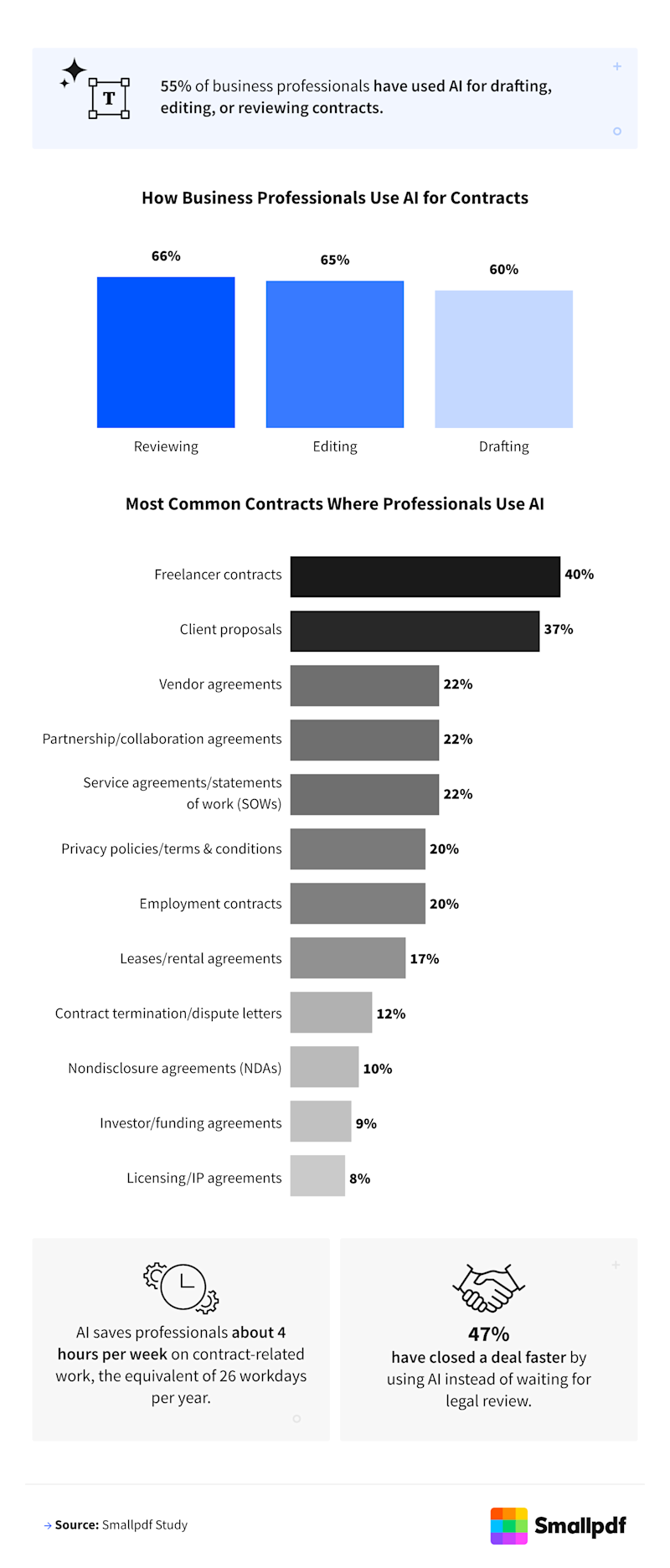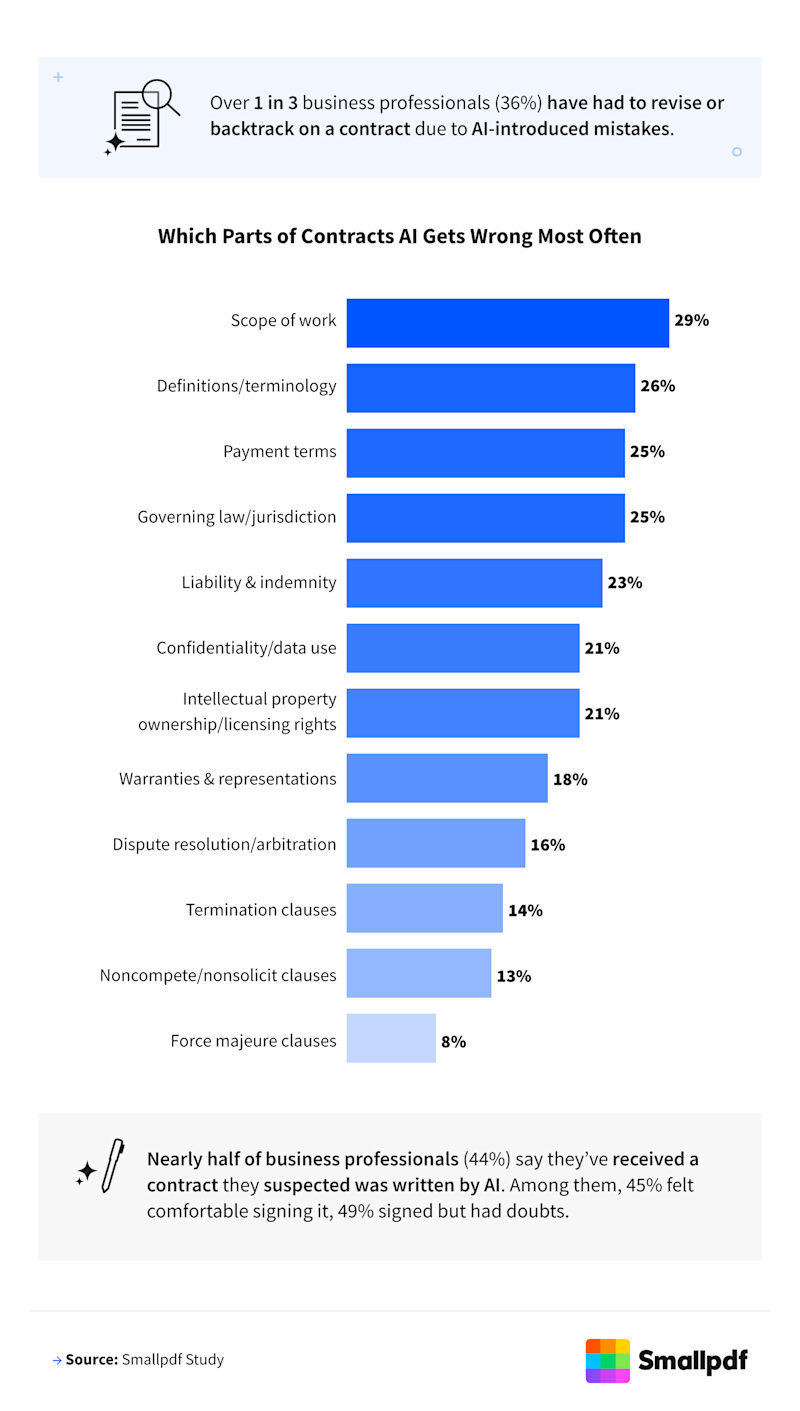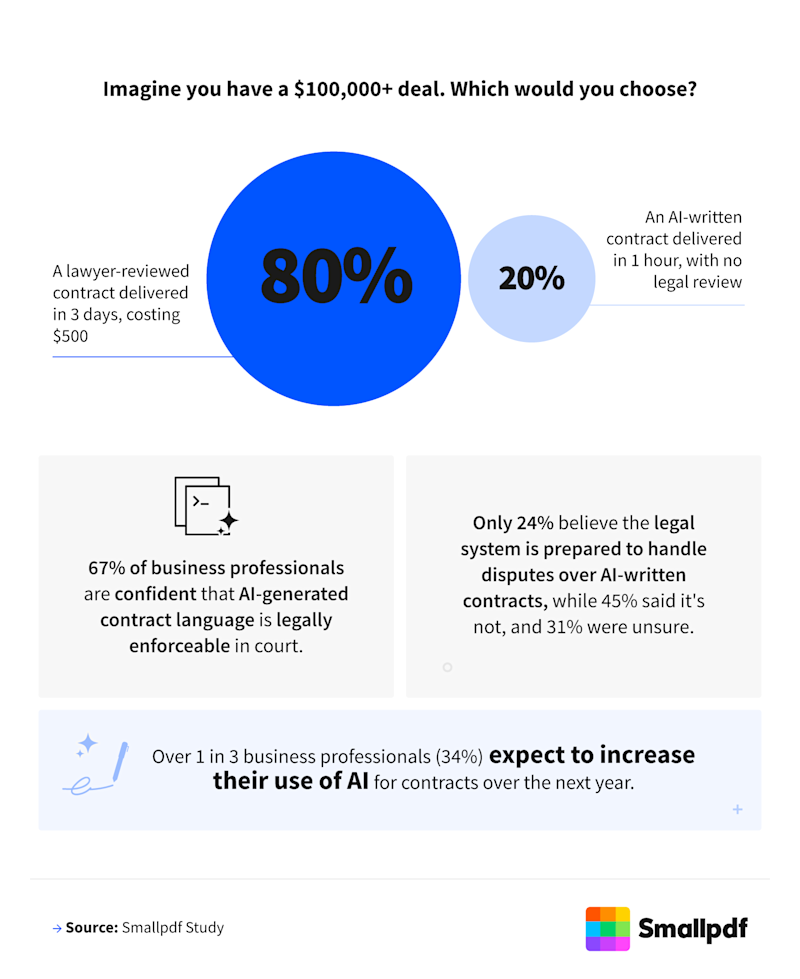
AI has entered the world of contracts, and it’s changing how small businesses, freelancers, and startups work.
From drafting proposals to reviewing agreements, professionals are finding faster ways to manage legal paperwork with the help of tools like ChatGPT, Claude, and Copilot. But while AI saves time and money, it also introduces new questions about trust, compliance, and legal accuracy.
This study takes a closer look at how professionals are using AI for contracts and where it’s raising concerns. To get these insights, Smallpdf commissioned a survey of 1,000 US professionals, including 800 full-time employees and 200 business owners, across different industries and generations. Since so much of this work happens through digital documents, these findings help us highlight both opportunities and risks, and how better document management can keep businesses protected.
Key Takeaways
- 55% of business professionals have used AI for drafting, editing, or reviewing contracts.
- AI saves professionals about 4 hours per week on contract-related work, the equivalent of 26 workdays per year.
- 47% have closed a deal faster by using AI instead of waiting for legal review.
- Nearly 1 in 2 business professionals (44%) have received a contract they suspected was AI-generated. Of those, 45% felt comfortable signing, and 49% signed hesitantly.
- 67% of business professionals are confident that AI-generated contract language is legally enforceable in court.
- 1 in 10 business professionals (10%) report saving over $10,000 in the past year by using AI instead of hiring legal counsel.
- Over 1 in 3 business professionals (34%) expect to increase their use of AI for contracts over the next year.
The Growing Role of AI in Contract Work
AI is no longer just for quick answers. It has become a useful tool in contract management. Many professionals are now using AI to handle sensitive agreements, proposals, and everyday legal tasks.

Infographic showing 55% of professionals use AI for contracts, mainly reviewing, editing, and drafting freelancer agreements.
More than half of business owners (55%) said they’ve used AI to draft, edit, or review contracts, showing how widespread adoption has already become. The biggest advantage is efficiency. AI saves professionals about 4 hours per week on contract-related work, which adds up to the equivalent of 26 workdays a year. Nearly half (47%) reported that AI allowed them to close a deal faster than if they had waited for a traditional legal review.
The financial impact is also significant. Business professionals reported saving an average of $2,300 in the past year by using AI instead of hiring legal counsel. For some, the savings were much higher, with 1 in 10 saving over $10,000. On average, professionals spent 30 minutes revising AI-generated contracts before sending them out, though 1 in 7 admitted to spending five minutes or less.
Still, there are reasons many professionals avoid AI altogether, including:
- Not trusting AI for legal matters: 20%
- Privacy or data security concerns: 18%
- Haven’t needed it yet, but curious to try: 18%
- Ethical concerns about using AI in legal matters: 15%
- Prefer to use a lawyer or legal professional: 14%
Of those who haven’t used AI, 74% said they would consider it in the future. When asked if they would trust a contract written with AI, 68% said yes, 20% said no, and 12% were unsure.
While adoption and savings are clear, these findings also point to a current tension. AI may boost efficiency, but it hasn’t erased concerns about mistakes or oversight. This becomes even more evident when looking at the risks professionals face.
Risks and Red Flags of AI Contracts
Even as AI becomes more common in contract workflows, mistakes and doubts remain. Professionals continue to rely on human oversight to make sure these agreements are valid, but risky behaviors persist.

Infographic showing common contract mistakes made by AI, including scope of work, payment terms, and legal definitions.
Over 1 in 3 professionals (36%) reported having to revise or backtrack on a contract due to AI-introduced mistakes. The most common errors appeared in:
- Scope of work: 29%
- Definitions or terminology: 26%
- Payment terms: 25%
- Governing law or jurisdiction: 25%
- Liability and indemnity: 23%
Other problem areas included confidentiality and data use (21%), intellectual property (21%), warranties and representations (18%), and termination or dispute resolution clauses.
Suspicion about AI-written contracts is also widespread. Nearly half of professionals (44%) said they had received a contract they believed was AI-generated. Of those, 45% felt comfortable signing, while 49% signed despite doubts. To reduce risk, nearly 9 in 10 professionals said they make sure that a human reviews AI-assisted contracts before signing.
Yet, some concerning practices remain. About 1 in 3 (31%) never disclose when they use AI for contracts, and over 1 in 10 (12%) have had a contract rejected, flagged, or questioned because it appeared AI-generated. More than half (54%) said they always remove or anonymize sensitive details before pasting into AI, but 31% admitted to adding legal-sounding language they didn’t fully understand. Another 25% said they skip legal review altogether to save time or money.
So, while AI can save time and money, many professionals still question whether its output can withstand the scrutiny of courts and regulators. That uncertainty sets the stage for the next challenge, legal enforceability and trust in the system.
These errors can have real consequences. For instance:
- An unenforceable clause could void part of an agreement, leaving a company exposed during a dispute.
- Omitting liability or indemnity terms may shift unexpected risk onto a business partner.
- Pasting sensitive contract details into AI prompts risks data exposure or compliance violations if third-party platforms store the information.
These scenarios show how small mistakes with AI can escalate into costly legal or security problems.
Confidence and the Future of AI Contracts
Looking ahead, businesses expect AI’s role in contracts to grow, but uncertainty remains about legal enforceability and the court system's readiness.

Infographic showing most professionals prefer lawyer-reviewed contracts over AI-written ones, despite rising AI adoption.
More than 3 in 5 professionals (67%) were confident that AI-generated contract language is enforceable in court. However, just 24% believed the legal system is currently prepared to handle disputes involving AI-written contracts. Almost half (45%) said the system isn't ready, while 31% were unsure.
Despite this, adoption is projected to expand. Over 1 in 3 professionals (34%) said they expect to increase their use of AI for contracts in the next year. Certain industries are leading this shift, with Marketing, Finance, Healthcare, Tech, and Manufacturing most likely to increase AI use for contracts. Some are even willing to take major risks, with 1 in 5 saying they would choose an AI-written contract over a lawyer-reviewed one for a $100,000+ deal.
AI’s usefulness also extends beyond contract drafting. More than half of professionals (57%) reported using AI to translate complex legal jargon into plain English for colleagues or clients. Trust in fairness is also emerging, with nearly 2 in 5 (38%) believing both parties benefit equally from AI-written contracts.
Together, these findings suggest a future where AI is deeply embedded in contract workflows, but with legal systems, businesses, and professionals still working out the rules of engagement.
Practical Takeaways for Using AI in Contracts
AI can be a powerful ally for contract work, but professionals should take steps to protect sensitive data and ensure accuracy. Here are some best practices:
- Always review with a human. Even small errors in contracts can lead to big problems. A second set of eyes, preferably legal, adds protection.
- Remove sensitive details. Before pasting information into AI tools, strip out confidential names, numbers, and clauses.
- Use AI for drafts, not final copies. Treat AI-generated content as a starting point that needs refinement, not a ready-to-sign document.
- Stay transparent. Clearly communicate when AI has been used to draft or edit agreements, especially with partners or clients.
- Keep up with regulations. Follow updates from trusted sources like the American Bar Association to ensure your use of AI aligns with evolving legal standards.
Contracts in the Age of AI
AI is saving professionals time and money on contracts, with many reporting faster deal cycles, lower legal costs, and greater efficiency. At the same time, concerns about mistakes, data privacy, and enforceability make it clear that AI is not a replacement for human review. For small businesses, freelancers, and startups, the best path forward is to treat AI as a drafting tool. One that can streamline routine tasks, while relying on legal expertise to confirm accuracy and protect long-term interests.
Methodology
This research comes directly from Smallpdf’s commissioned survey of 800 full-time American professionals and 200 business owners. We set out to understand how AI tools are reshaping contract workflows for U.S. small businesses. Participants’ average age was 40; 47% were female, 51% were male, and 2% were non-binary. Generationally, 31% were baby boomers and Gen X combined, 53% were millennials, and 16% were Gen Z. These first-hand insights provide a unique and credible snapshot of how AI is being used in sensitive legal contexts today.
About Smallpdf
Smallpdf helps millions of professionals and businesses simplify digital document management with secure, easy-to-use tools. From protecting sensitive files to streamlining workflows, Smallpdf makes working with PDFs simple. Popular tools include Compress PDF to reduce file size, Merge PDF to combine documents, and PDF to Word to quickly convert files for editing. With Smallpdf, you can manage documents smarter and more efficiently in today’s AI-driven workplaces.
Fair Use Statement
If you’d like to share these findings, we encourage you to do so for noncommercial purposes. Please include a link back to this page to provide proper credit and access to the full study.
